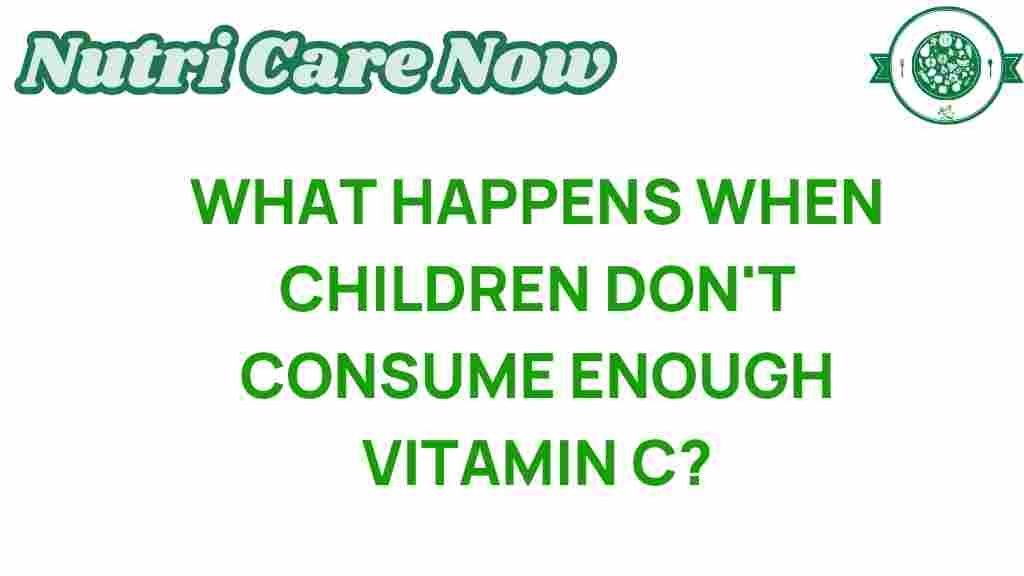The Hidden Consequences of Vitamin C Deficiency in Children
Vitamin C plays a crucial role in the overall health and development of children. Despite its importance, vitamin C deficiency is often overlooked, leaving many children at risk for a variety of health issues. This article will explore the hidden consequences of vitamin C deficiency in children, focusing on health risks, the immune system, and the importance of proper nutrition.
Understanding Vitamin C and Its Role in Children’s Health
Vitamin C, also known as ascorbic acid, is a vital nutrient that supports various bodily functions. It is essential for:
- Maintaining a healthy immune system
- Promoting wound healing
- Supporting the growth and repair of tissues
- Enhancing the absorption of iron from plant-based foods
- Acting as an antioxidant, protecting cells from damage
Children have specific dietary needs, and ensuring they receive adequate vitamin C is critical for their growth and development. Unfortunately, many children do not meet the recommended daily intake of this essential nutrient.
Signs and Symptoms of Vitamin C Deficiency
Vitamin C deficiency can lead to several health problems in children. Some common signs and symptoms include:
- Frequent infections due to a weakened immune system
- Fatigue and lethargy
- Swollen or bleeding gums
- Joint pain and swelling
- Bruising easily
- Dry, scaly skin
If left untreated, severe vitamin C deficiency can lead to scurvy, a condition characterized by anemia, debility, pain, edema, and ulceration of the gums. Scurvy is a serious health risk that can have lasting effects on a child’s well-being.
Health Risks Associated with Vitamin C Deficiency
The health risks of vitamin C deficiency in children extend beyond scurvy. Some of the major health concerns include:
- Weakened Immune System: Vitamin C is essential for the proper functioning of the immune system. A deficiency can lead to increased susceptibility to infections, such as colds and flu.
- Delayed Wound Healing: Children who lack sufficient vitamin C may experience delayed healing of wounds and injuries, which can affect their overall health and activity levels.
- Growth and Development Issues: Vitamin C is critical for the growth and repair of tissues. Insufficient intake can hinder a child’s physical development.
- Hormonal Imbalances: Vitamin C also plays a role in the synthesis of certain hormones. A deficiency can disrupt hormonal balance, affecting a child’s mood and energy levels.
Preventing Vitamin C Deficiency in Children
Prevention is key when it comes to vitamin C deficiency in children. Here are some effective strategies:
- Include Vitamin C-Rich Foods: Ensure that your child’s diet includes plenty of fruits and vegetables high in vitamin C, such as:
- Oranges
- Kiwi
- Strawberries
- Bell peppers
- Broccoli
- Brussels sprouts
- Encourage Healthy Eating Habits: Teach children the importance of a balanced diet rich in fruits and vegetables.
- Consult with a Pediatrician: Regular check-ups can help identify any nutritional deficiencies early on. A pediatrician can provide personalized advice on dietary needs.
- Consider Supplements: If necessary, consider vitamin C supplements after consulting with a healthcare provider.
Step-by-Step Process for Increasing Vitamin C Intake
Here’s a simple process to help increase your child’s vitamin C intake:
- Assess Current Diet: Take note of your child’s current dietary habits and identify any gaps in fruit and vegetable consumption.
- Plan Balanced Meals: Create a weekly meal plan that incorporates vitamin C-rich foods. Aim for at least one serving of fruit or vegetable at each meal.
- Make Snacks Healthy: Replace sugary snacks with fruits like oranges, strawberries, or a fruit smoothie.
- Get Kids Involved: Involve children in grocery shopping and meal preparation to increase their interest in healthy foods.
- Monitor Progress: Keep track of your child’s energy levels, mood, and overall health to see if improving their diet has a positive effect.
Troubleshooting Tips for Parents
If your child is resistant to eating fruits and vegetables, here are some troubleshooting tips:
- Make It Fun: Present fruits and vegetables in fun and creative ways, such as adding them to smoothies or making fruit kabobs.
- Set an Example: Be a role model by eating a variety of fruits and vegetables yourself.
- Gradual Introduction: Introduce new fruits and vegetables gradually to avoid overwhelming your child. Start with small portions and encourage tasting.
- Positive Reinforcement: Praise your child for trying new foods, even if they don’t like them at first.
The Importance of Nutrition Education
Educating children about nutrition is an essential part of preventing vitamin C deficiency. Here’s how to promote understanding:
- Teach About Nutrients: Help children understand the role of different nutrients in their bodies, including the importance of vitamin C.
- Use Visual Aids: Use charts or diagrams showing which foods are high in vitamin C and other essential nutrients.
- Incorporate Learning into Activities: Use cooking classes or gardening as opportunities to teach about healthy eating.
Conclusion
Vitamin C deficiency in children can lead to serious health risks, including a weakened immune system and delayed wound healing. As parents and caregivers, it is crucial to ensure that children meet their dietary needs for vitamin C through balanced nutrition. By promoting healthy eating habits, involving children in food preparation, and providing education about nutrition, we can help prevent vitamin C deficiency and ensure our children grow healthy and strong.
For more information on children’s nutrition, consider visiting the American Academy of Pediatrics. Regular check-ups with a pediatrician can also provide valuable insights into your child’s specific dietary needs.
Don’t wait until symptoms arise; take proactive steps today to ensure your child receives the necessary nutrients for optimal health!
This article is in the category Health and created by NutriCareNow Team
